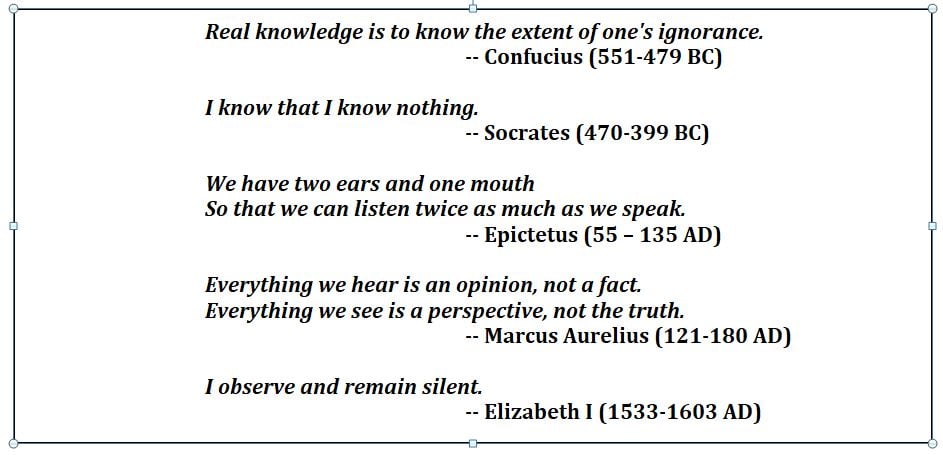Leadership Communication Advice: SHUT UP! And Listen Before You Lead.
When I consider the root cause behind many of the fundamental missteps in leadership that I’ve either witnessed, or personally perpetuated, it almost always boils down to one common shortcoming - that leaders consistently fail to actively listen. In fact, this isn’t simply about leaders. It applies to sales professionals, consultants, and negotiators of all stripes.

This One Leadership Communication Skill Helps You Become a Better Leader
Truly effective leaders lead from a place of inquiry and perspective. They’re mindful of their audience. They recognize the inherent bias of their own perspectives. And they actively manage their perceptual blind spots by seeking out the opinion of others. In short, they ask questions. Lots of questions. But under the pressures of every day deliverables, we forget. We drive our agenda, without considering the perspectives, ideas, and advice of others.
Even the Best Minds Struggle
We shouldn’t beat ourselves up about this. Some of the greatest historic minds and hallowed leaders have tripped over this challenge time and again. Managing perspective, perception, and bias is tricky business:

More recently, Jeff Bezos has spoken about the “intellectual humility” of winning leaders. Good leadership, he said, is the ability to consider and accept new information, new ideas, and new points-of-view that may challenge and contradict established thinking.
Harness Perspective
Sound straightforward? Yes. But is it easy? Absolutely not. It’s damn hard to maintain this open frame of mind, all the time. It’s an intellectual and social muscle we need to work out constantly. But it’s absolutely critical in leadership. And here’s why. Harnessing multiple perspectives is powerful stuff. When you’re on the “hot seat,” no matter what the challenge, collecting different points-of-view will guarantee:
· More Inclusive Interpretations
· More Informed Decisions
· More Encompassing Solutions
· More Persuasive Effect
· More Productive Outcomes
· More Effective Leadership
· More Empathetic Leadership
Understand Our Blind Spots
Recognize also that each of us is hampered by perceptual blind spots every day. What we believe we understand about a situation, a challenge, an event, a statement, or set of data-points will always be filtered through an imperfect lens. Our personal understanding of the world is constrained by multiple limitations: our physiology, formal education, skills-training, experiential knowledge, language, upbringing, cultural background, conditioning, gender, ethnicity, belief systems, and so forth. So as much as we think we may have a solid “grip” on reality, we can remain oblivious to our own ignorance. “We don’t know what we don’t know.”
Be the Last to Speak
So do your best to lead from a place of inquiry. How do you keep this top of mind? Simon Sinek offers a simple, instructive tip. “Be The Last to Speak.” Whether one-on-one, or managing a roomful of colleagues – ask first; share last. Practice with consistency, and you’ll discover a double dividend. When you lead with questions, you’ll gather ideas, information, and perspectives you may not have considered. You’ll capture that input before you’ve uttered a word, and tainted someone’s mindshare with your own opinions. But you’ll also cultivate a work environment of respect and recognition. Because you will have given your team a chance to feel heard. And it’s a fundamental human desire to be acknowledged.
Discover the Answers
What’s the final message here? Leadership is not about having all the answers. It’s about cultivating a "safe" and "constructive" environment in which to discover the answers. Your job is to gather and harness perspective. And then use those perspectives to form an opinion and make a meaningful decision
So…. Shut Up! And Listen…. Before You Lead.
 Chris has 20+ years experience in strategic marketing and operational start-ups, and has helped organizations position for market entry, streamline execution, push through financial ceilings, and build foundations to become best-in-field. An associate of CanadaStartUp.com, Chris supports ventures across a broad range of sectors including construction management software, e-learning, workplace hygiene, therapeutic apparel, industrial automation, event technologies, and anti-counterfeit authentication platforms. A part-time BCIT and Tamwood College faculty-member, Chris is a strong advocate of continued learning, and devotes his spare energies towards providing practical, no-nonsense training to young professionals and entrepreneurs who need easily compressed, essential lessons (both theoretical and tactical) in a regularly changing business landscape.
Chris has 20+ years experience in strategic marketing and operational start-ups, and has helped organizations position for market entry, streamline execution, push through financial ceilings, and build foundations to become best-in-field. An associate of CanadaStartUp.com, Chris supports ventures across a broad range of sectors including construction management software, e-learning, workplace hygiene, therapeutic apparel, industrial automation, event technologies, and anti-counterfeit authentication platforms. A part-time BCIT and Tamwood College faculty-member, Chris is a strong advocate of continued learning, and devotes his spare energies towards providing practical, no-nonsense training to young professionals and entrepreneurs who need easily compressed, essential lessons (both theoretical and tactical) in a regularly changing business landscape.
